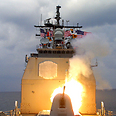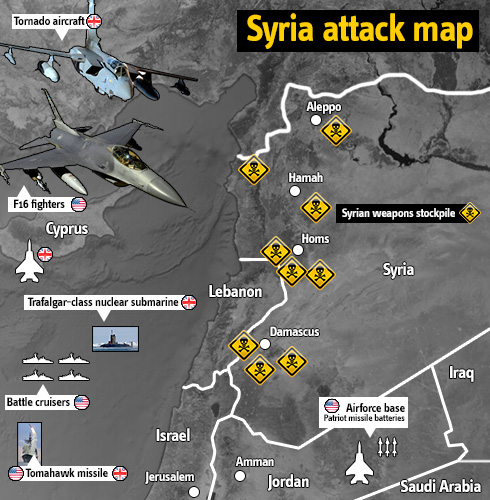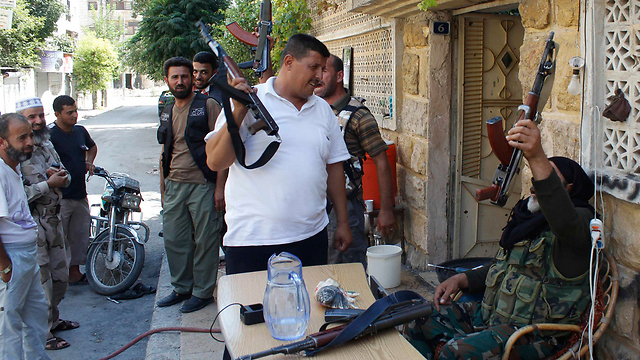
Western coalition to attack Syria
Analysis: Kerry's statement was unequivocal. There are 2 possible courses of action: Striking chemical weapons reserves or attacking Syrian army, regime establishments. How will Assad act against Israel, what will Russia do?
The top American diplomat clarified that the US has proof beyond what was already known, and he even hinted that this evidence was obtained as a result of cooperation with allies. He promised that Washington would present evidence of chemical weapons use in the coming days, and also mentioned the attempt by the Assad regime to conceal its use of chemical weapons for five days by not allowing UN inspectors access to the attack sites, and even bombing them to remove all traces of the poisonous gas.
By the time the regime had finally given the inspectors access it was too late, Kerry stressed. This part of his statement is important, because it shows that the US views the attempt to conceal the indiscriminate use of chemical weapons against civilians as a crime in itself. And then came the remark which left no room for doubt about what is about to transpire: "Make no mistake: President Obama believes there must be accountability for those who would use the world's most heinous weapons against the world's most vulnerable people."
Now the question remains when and how the US will act. What is already certain is that Washington will not act alone, but in the framework of an international coalition that has already been formed. This coalition will consist of the US, Britain, France and Turkey. Germany may join at a later stage. President Obama and said countries' leaders have already agreed in principle to form the coalition, and now talks are being held to coordinate the operational aspects.
Plan of action, the day after
The planning and coordination focus on two key areas: The first – the plan of action and the forces that will perform it, and the other – the "day after" plans. It will be a mainly American operation, but it may also affect countries that will not directly take part, such as Israel and Jordan. It can be assumed that these matters were discussed by Chairman of the US Joint Chiefs of Staff General Martin Dempsey in his meetings in Jordan with European and other countries' defense chiefs.
(Photo: MCT)
Obama and his allies, Britain, France and other NATO members, are faced with several courses of action. They will be determined by the strategic goals that are supposed to be achieved by an operation in Syria. There are several options, and these are the main ones:
1. Deterrence of Syrian use of chemical weapons in the future – and through this, deterrence of Iranian development of nuclear weapons. If this will be the objective, chemical weapons materials reserves will be bombed. In addition, missile and rocket storage sites and launching pads will be struck, and perhaps airports as well. An attack on the anti-aircraft missile system will also be considered.
2. Reprimanding the regime and threatening its survival - If this option is chosen, regime institutions and symbols, anti-aircraft systems and perhaps even logistics camps and the president's Republican Guard will all be struck using cruise missiles and airstrikes.
These are the main courses of action and very likely there will be a combination of these two options. Kerry's remarks indicate that the US has decided that the response will not be "lukewarm".
Minor response, possibly against Israel
Israel has already begun quietly preparing for the possibility of a Syrian response against it. It is estimated that President Bashar Assad and his men will not want to exacerbate their situation, and will "contain" the American blow. That is, they will not respond forcefully with the great arsenal of rockets and missiles in their possession. This estimation is based on the knowledge that Assad is well aware that Israel's involvement in the war may decide the fate of his regime and the Alawite community. However, a Syrian response should most definitely be expected; but it will be one that will not cause a powerful Israeli comeback. The most obvious possibility is terror attacks and shootings in the vicinity of the Golan Heights border or terror attacks abroad against Israeli targets.
In both cases, the Syrians will do anything to hide their fingerprints and will attempt to conduct the shootings and attacks by proxy, for example through Hezbollah or Ahmed Jibril's organization who stand alongside Assad. In any case, the matter will be reflected through the launching of small-diameter rockets, mortar shells or small-scale bombing attacks, so that Damascus could claim they "did something" yet not absorb a harsh response from Israel.
As to the Iranians and Hezbollah – they will be partners and perhaps the major contractors of the attacks abroad, which will have embassies and official Israeli institutions abroad on high alert.
Less than 48 hours
Russia, most likely, will demand an urgent meeting of the Security Council, and together with China it will demand a resolution that orders the United States and its NATO allies to stop the attack. It may already be too late, since the attack will not take more than 24 hours, perhaps even less. But if the US will want, for example, to make sure that all of the chemical weapons stockpiles were destroyed or that the Syrian anti-missile system was wiped out, it may take more than 48 hours. It all depends on the operation's objectives and the means that will be exercised.
Russia may also respond to an American strike with the transfer of S-300 missiles to Syria and with increasing its present in the Mediterranean Sea near the Syrian shore and in Tartus port. So far, Russia withheld shipment of anti-aircraft missiles and S-300 missiles to Syria due to repeated requests from Israel and American pressure. An American operation may give it the excuse to provide the system, which was already paid for by the Syrians with Iranian funding. Russia may even decide to provide Iran with newer anti-aircraft batteries, S-400, a shipment that has been delayed for several years. If Russia indeed provides Syria with the S-300 missiles, Israel may respond.
It now remains to see when this will happen. It is likely that the operation will be carried out after a joint action between the US and its allies is formulated, after the forces along the Syrian shore accumulated ammunition and after Israel, Jordan and Turkey will make the necessary preparations for "the day after". It is likely that Israel will be given a secret "heads up" ahead of the operation, shortly before it takes action.
It should be emphasized that four American destroyers are already in the eastern Mediterranean and have moved closer to Syria in preparation for action, thus the timetable may be shortened. NATO has many operation bases from which an attack on Syria can be carried out in Turkey and Greece, as well as Navy and Air Force bases in Italy. US President Barack Obama must make a decision together with David Cameron and President Hollande, and the operation will be on the go. The earliest possible date for the operation to begin is Wednesday, and as of that day, everyone is on alert.













